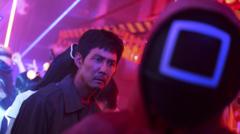After gaining notoriety as a cultural phenomenon, “Squid Game” has become synonymous with South Korean drama, but creator Hwang Dong-hyuk’s journey has not been without personal sacrifices. As he resumes shooting the second season of the dystopian thriller, Hwang recalls how the stress from the first series cost him at least nine teeth. “I was worn out,” he shares during a recent interview.
Initially hesitant to return for a sequel due to the toll it took on him, his perspective shifted when financial realities dawned on him. “It was the money,” he admits bluntly. Despite the phenomenal success of the first season on Netflix, he found his earnings modest compared to global royalties, which incentivized his return. “I also realized I didn’t complete the narrative,” Hwang adds earnestly.
The second season will dive into themes of survival, where a character from the previous series, Gi-hun, embarks on a mission to dismantle the deadly games. This new chapter is set against a backdrop of worsening global issues, including economic divides and climate concerns. “The pressure is enormous,” Hwang admits, highlighting the contemporary crises that fuel his storytelling ambition.
The creative approach for season two, as conveyed in a tour of the vibrant set, promises to amplify the tension. Contestants will face an ethical dilemma after each game, compelled to choose sides between survival or continuation—a metaphor reflecting current social polarization. Hwang perceives such dynamics as perilous, posing the question of humanity's capacity to address divisive truths of modern life: “Do we have the endurance to alter our traumatic trajectory?”
While the violence portrayed in “Squid Game” is meticulously conceived, he stands firm that it authentically represents the malign realities of modern society. As preparation for the series continues, the narrative will unveil more profound insights into the enigmatic Front Man, inviting viewers to explore his motivations and experiences, thus broadening the narrative equation.
Despite their international acclaim, creators like Hwang contend with challenges surrounding profit-sharing in the streaming era, where companies like Netflix command vast audiences yet exert material control over content ownership. Reflecting on his journey, he mentions the financial woes that lurked during his ambitious creative pursuits: “I struggled for a decade to get this project off the ground, only to earn a mere fraction of its value.”
Meanwhile, the Korean government faces mounting pressure to reform copyright laws that inadequately protect creators’ rights and earnings. The pushback traces its roots to the disparity experienced by directors, writers, and producers, who frequently find themselves working in side jobs to sustain their creative careers. The emerging collective of South Korean creatives reveals a collective frustration that echoes across the global streaming landscape.
Viewers of the eagerly anticipated second season of “Squid Game,” set for release on December 26, 2024, await answers to pressing questions, amid evolving plotlines and Hwang’s personal struggle with physical and mental weariness. “I’ll surely need more dental work soon,” Hwang chuckles, revealing the hidden costs of his pursuit—one that transcends mere storytelling to explore the life-altering consequences of art.



















